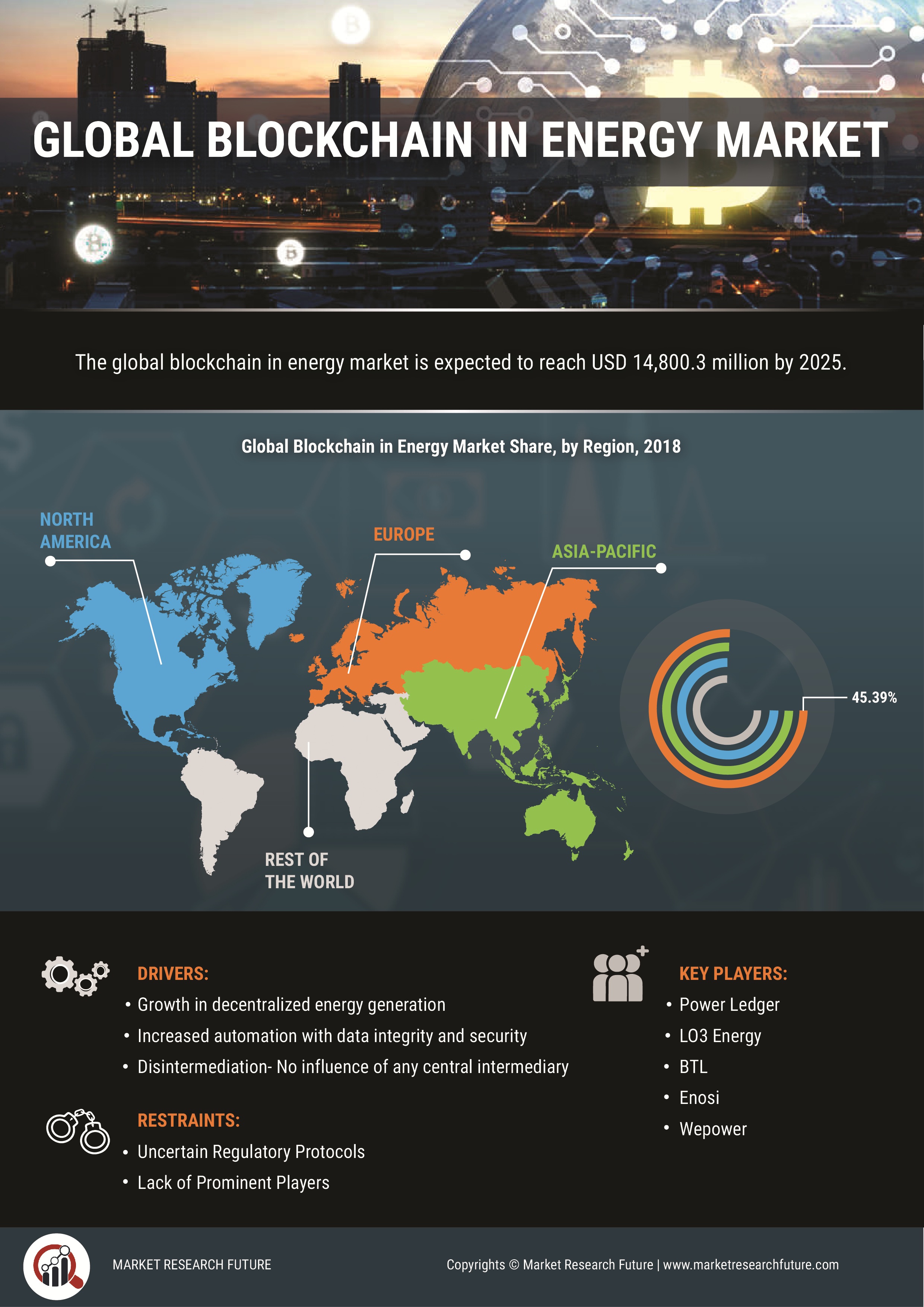What does Blockchain Technology Refer to?
Blockchain can be referred to as a database technology which can process and store transaction data. This technology is good at tracking and accounting for assets. Blockchain is highly adopted in almost every sector due to the security it provides. Blockchain technology applications have been experiencing tremendous growth since 2009 when a revolutionary Bitcoin white paper was published, driven by a healthy dose of hype and billion dollars in private funding. In blockchain technology, transactions are not stored in a central database but distributed to the participating computers which locally store the data. The energy sector is one among the several sectors applying blockchain technology. Despite being at a nascent stage, blockchain applications are considered to be very promising.
Global Blockchain in Energy market key players studied are Power Ledger Pty Ltd, WePower UAB, LO3 Energy, Inc, Grid +, BTL Group Ltd., The Sun Exchange (Pty) Ltd, Conjoule GmbH, Enosi Foundation and Electron (Chaddenwych Services Limited).
Get Free Sample Report at: https://www.marketresearchfuture.com/sample_request/5814
Detailed Regional Analysis
The blockchain in energy market’s regional analysis has been segmented into regions as APAC, North America, Europe, and Rest of the World. The European region is one of the forefront regions in the adoption of the blockchain technology. Germany had accounted for the most significant market share of 55.88% in 2017, with a market value of USD 46.6 million and is projected to grow at the highest CAGR of 81.49% during the forecast period. The North American region is one of the principal markets for the blockchain in the energy industry. Furthermore, the region is witnessing rapid growth in blockchain based energy projects as renewable-based energy generation sources are progressively contributing to the rising power demand of the region.
Applications of Blockchain Energy Sector:
Oil & Gas: Applications of blockchain technology is in its nascent stage. European energy traders have conducted a 12-week test on blockchain trading platform. The interest was further pushed by oil giants, British Petroleum and Eni. They aimed towards running independent blockchain oil and traders besides their live trading platforms. The test detected an error in trading volume, saving a lot of time. Blockchain technology ensures trading systems are safe from fraudulent trades and hacks.
Alternative Energy Distribution: The entire world is shifting from harmful sources of energy and dependence on fossil fuels to alternative energy sources. Solar energy is at the forefront and is followed by other alternative energy sources like hydrogen systems and wind. The current growth in Distributed Energy Grids and independent sources of renewable energy has been noticed recently. The sources are well connected to the grid, thereby converting energy consumers into producers selling excess power back to the grid. People owing solar panels can sell the excess electricity produced to their neighbors. Blockchain plays a major role here. The technology creates the first peer-to-peer system for electricity, which guarantee an exact record of the transaction. It also helps to optimize metering and accounting via decentralization, thus ensuring transparent sharing of information to the users.
Asset Integrity and Maintenance: A prominent application works on the data gathered from sensors placed on assets and equipment. The idea is to use them in order to detect defects and prevent losses. The system also helps to garner data through blockchain IoT and develop a model that can predict events, thus enabling anticipatory planning.
Advantages of Blockchain in Energy
Utilization of blockchain technology has numerous benefits in the energy industry. Companies have shown savings of 50 to 60 percent from structural cost due to blockchain technology. Companies will make huge profits in the long run from blockchain to transform their service delivery.
Blockchain is interesting for decentralized processes that need a large network. The technology provides great benefits to the power and utility sector, with its large network of power and utility companies, suppliers, and end-users.
The smart grid is one of the prime areas where blockchain can disrupt the industry. For instance, a lot of people have shifted to electric cars in the past few years. Smart grids will allow charging their cars without having to face any issues.
Segmental Analysis
The blockchain in energy market is segmented on the basis of end-use industries, technology type, platform type, implementation type, and application type. By technology type, the market is segmented into closed blockchain, open blockchain, hybrid blockchain and consortium blockchain. Closed Blockchain is accredited for a significant market share of 77.71% in 2017, and is projected to develop at the highest CAGR of 76.88% during the forecast period. The platform type basis of segmentation of the market comprises of hyperledger, ethereum, tendermint, and interbit. Ethereum is responsible for the leading market share of 76.89% in 2017, with a market value of USD 138.6 and is likely to develop at the highest CAGR of 78.56% during the forecast period.
For more information on “Blockchain in Energy Market Research Report – Global Forecast till 2024” visit: https://www.marketresearchfuture.com/reports/blockchain-in-energy-market-5814
About Market Research Future:
At Market Research Future (MRFR), we enable our customers to unravel the complexity of various industries through our Cooked Research Report (CRR), Half-Cooked Research Reports (HCRR), Raw Research Reports (3R), Continuous-Feed Research (CFR), and Market Research & Consulting Services.
Media Contact
Company Name: Market Research Future
Contact Person: Abhishek Sawant
Email: Send Email
Phone: +1 646 845 9312
Address:Market Research Future Office No. 528, Amanora Chambers Magarpatta Road, Hadapsar
City: Pune
State: Maharashtra
Country: India
Website: https://www.marketresearchfuture.com/reports/blockchain-in-energy-market-5814

